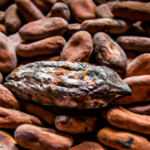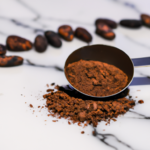Raw Food Ingredients
Why Does Raw Cacao Make Me Poop

Have you ever pondered why raw cacao causes bowel movements? I have some intriguing information to share with you.
It turns out that the composition of raw cacao, along with the complex gut-brain connection, can stimulate bowel movements in some individuals. Raw cacao contains a good amount of fiber and magnesium, both of which promote healthy digestion. Additionally, the natural compounds found in cacao, such as theobromine, can have a stimulating effect on the digestive system.
However, it’s important to note that not everyone experiences this effect, as individual sensitivity to raw cacao can vary. In fact, some people may even find raw cacao beneficial for their digestion. So, if you’ve noticed a correlation between consuming raw cacao and increased bowel movements, it’s likely due to these factors.
In this article, we’ll explore the science behind why raw cacao may make you poop, as well as discuss potential benefits and precautions to keep in mind.
Key Takeaways
- Raw cacao contains theobromine, which can have a laxative effect and contribute to increased bowel movements.
- Consuming raw cacao in moderation can help promote regular bowel movements and support healthy digestion.
- Individual reactions to raw cacao may vary, and excessive consumption can lead to gastrointestinal discomfort.
- Raw cacao is high in fiber and antioxidants, which can aid in digestion and support a healthy gut microbiome.
The Composition of Raw Cacao
The composition of raw cacao is a fascinating blend of minerals, antioxidants, and phytochemicals that can have a stimulating effect on the digestive system, potentially resulting in increased bowel movements.
One key component of raw cacao is theobromine, a natural stimulant that acts as a mild laxative by relaxing the muscles in the digestive tract. Theobromine content in raw cacao is higher than in processed chocolate, making it more likely to have a noticeable impact on bowel movements.
Additionally, raw cacao is rich in antioxidants, which can help improve overall gut health and promote regularity. The combination of theobromine and antioxidant properties may explain why consuming raw cacao can have a ‘pooping’ effect for some individuals.
Moving forward, it is important to explore the gut-brain connection to understand the full impact of raw cacao consumption on our digestive system.
The Gut-Brain Connection
One possible reason for the effect of raw cacao on digestion could be the strong connection between the gut and the brain. The gut and the brain communicate through a complex network of nerves, hormones, and chemicals. This gut-brain communication is known as the gut-brain axis and plays a crucial role in regulating various bodily functions, including digestion.
Here are four ways in which the gut-brain connection can impact digestion:
-
Emotions: Stress, anxiety, and other emotional states can affect the gut-brain axis and lead to changes in digestion, including increased bowel movements.
-
Nervous system activation: The gut-brain axis can activate the parasympathetic nervous system, which helps promote digestion and bowel movements.
-
Hormonal changes: The gut-brain axis can influence the release of hormones that regulate digestion, such as serotonin and cortisol.
-
Microbiome modulation: The gut-brain axis can also impact the gut microbiome, which plays a crucial role in digestion.
Understanding the gut-brain connection can help explain why raw cacao can stimulate bowel movements. It is important to note that individual responses may vary, and consulting a healthcare professional is always recommended.
Stimulating Bowel Movements
Stimulating bowel movements can be attributed to the effect that raw cacao has on the digestive system. One possible explanation is the high dietary fiber content in raw cacao, which acts as a bulking agent and promotes regularity. Flavonoids, compounds found in raw cacao, have also been shown to have a laxative effect. However, it’s important to note that individual sensitivity to raw cacao can vary. Factors like hydration and water consumption can also influence bowel movements. It’s always recommended to listen to your body and make adjustments to your diet accordingly.
Now, let’s explore the topic of individual sensitivity to raw cacao.
Individual Sensitivity to Raw Cacao
Feeling the rich, velvety indulgence of raw cacao can be a personal journey that awakens your senses and leaves you craving for more. However, individual tolerance to raw cacao can vary, and some people may experience digestive issues after consuming it.
Raw cacao contains natural stimulants like caffeine and theobromine, which can have a stimulating effect on the digestive system. These compounds can increase intestinal contractions and speed up the transit of food through the digestive tract, leading to more frequent bowel movements.
Additionally, raw cacao is rich in fiber, which can also promote regularity. It is important to listen to your body and pay attention to how raw cacao affects your digestive system. If you experience discomfort or excessive bowel movements, it may be necessary to reduce your intake.
Transitioning to the next section, raw cacao also offers potential benefits for overall health.
Potential Benefits of Raw Cacao
Raw cacao has several potential benefits that make it an interesting addition to a healthy diet.
First, it has natural laxative properties, which can help with digestion and relieve constipation.
Second, raw cacao promotes regularity by stimulating the muscles in the digestive system, aiding in the movement of waste through the intestines.
Lastly, raw cacao has detoxification effects, as it contains high levels of antioxidants that help eliminate toxins from the body.
These benefits make raw cacao a valuable ingredient for maintaining a healthy digestive system and overall well-being.
Natural Laxative Properties
When I consume raw cacao, its natural laxative properties gently coax my digestive system into action, ensuring a smooth and satisfying bowel movement.
Raw cacao contains compounds such as fiber, magnesium, and theobromine, which can contribute to its natural laxative effect.
Fiber adds bulk to the stool, promoting regularity and preventing constipation.
Magnesium helps relax the muscles in the gastrointestinal tract, allowing for easier passage of waste through the intestines.
Theobromine stimulates the muscles in the digestive system, further aiding in bowel movement.
These natural remedies found in raw cacao can support digestive health and alleviate occasional constipation.
Incorporating raw cacao into your diet in moderation can be a delicious and nutritious way to promote regularity.
Promotes Regularity
After exploring the natural laxative properties of raw cacao, let’s delve into how it promotes regularity.
Raw cacao contains a high amount of dietary fiber, which is essential for maintaining healthy digestion. The fiber acts as a natural laxative, adding bulk to the stool and stimulating bowel movements. This helps to prevent constipation and ensures that waste is efficiently eliminated from the body.
Additionally, raw cacao contains magnesium, a mineral known for its ability to relax muscles, including those in the digestive tract. This can further aid in promoting regular bowel movements.
So, if you find that raw cacao makes you poop, it’s likely because of its natural laxative effects.
Moving forward, let’s explore the detoxification effects of raw cacao and how it can benefit our overall health.
Detoxification Effects
To experience the detoxification effects of raw cacao, you’ll be amazed at how it can help cleanse and rejuvenate your body. Raw cacao contains a high amount of antioxidants, which play a crucial role in the detoxification process. These antioxidants help neutralize harmful toxins in the body, promoting a healthier digestive system.
One of the key benefits of raw cacao is its ability to stimulate the production of digestive enzymes, which aids in the breakdown and elimination of waste products from the body. Additionally, raw cacao is rich in fiber, which promotes regular bowel movements and helps remove toxins from the colon.
To better understand the detoxification effects of raw cacao, take a look at the following table:
| Detoxification Effects of Raw Cacao |
|---|
| Stimulates production of digestive enzymes |
| Rich in fiber for regular bowel movements |
| Neutralizes harmful toxins |
| Promotes a healthier digestive system |
Incorporating raw cacao into your diet can be a natural way to support your body’s detoxification process. However, it’s important to note that individual reactions may vary. In the next section, we will discuss precautions and considerations to keep in mind when consuming raw cacao.
Precautions and Considerations
Although raw cacao may provide various health benefits, it is crucial to be mindful of any precautions and considerations before consuming it. While raw cacao is generally safe for most people, some individuals may experience certain health implications.
Raw cacao contains caffeine and theobromine, which can have a stimulating effect on the digestive system. This can lead to increased bowel movements and, in some cases, diarrhea. It is important to note that excessive consumption of raw cacao can also cause gastrointestinal discomfort, such as bloating and stomach cramps.
Additionally, raw cacao contains oxalates, which can contribute to the formation of kidney stones in susceptible individuals. Therefore, it is advisable to consume raw cacao in moderation and be aware of any personal sensitivities or medical conditions that may be affected by its consumption.
Transitioning into the subsequent section about ‘other factors that affect digestion,’ it is important to consider various factors that can impact how your body processes and digests raw cacao.
Other Factors that Affect Digestion
When it comes to digestion, there are several factors that can play a role in how our bodies process and eliminate food.
One important factor is our overall diet and lifestyle choices. The foods we consume on a regular basis, as well as our level of physical activity, can greatly impact our digestion.
Additionally, stress and anxiety levels can also have a significant effect on digestion. High levels of stress can disrupt the normal functioning of the digestive system and lead to issues such as bloating, constipation, or diarrhea.
Finally, the health of our gut and the balance of our microbiome also play a crucial role in digestion. The gut is home to trillions of bacteria that help break down and absorb nutrients from our food, and any imbalances in this delicate ecosystem can result in digestive problems.
Overall Diet and Lifestyle
To promote a healthy digestive system, try incorporating more whole foods into your diet and maintaining an active lifestyle. Your dietary habits play a significant role in your digestion. Consuming a diet rich in fiber, fruits, vegetables, and lean proteins can support regular bowel movements and prevent constipation. Drinking plenty of water helps to soften stools and aids in digestion.
Similarly, regular exercise can stimulate the muscles in your digestive tract, promoting efficient movement of food through your system. Aim for at least 30 minutes of moderate-intensity exercise most days of the week.
By focusing on your overall diet and lifestyle, you can create an environment that supports optimal digestion. This can help alleviate digestive issues and promote overall gut health.
Now, let’s explore how stress and anxiety levels can also impact your digestive system.
Stress and Anxiety Levels
To truly understand the impact of stress and anxiety on your digestive system, you need to recognize how these emotions can wreak havoc on your gut health.
Stress management plays a crucial role in maintaining a healthy digestive system. When we are stressed or anxious, our body releases stress hormones like cortisol, which can disrupt the normal functioning of our digestive system. This can lead to digestive disorders such as irritable bowel syndrome (IBS) or inflammatory bowel disease (IBD).
To manage stress effectively, try incorporating relaxation techniques like deep breathing exercises, yoga, or meditation into your daily routine. Additionally, regular exercise can help reduce stress levels and improve overall gut health.
By prioritizing stress management, you can support a healthy digestive system and reduce the chances of experiencing digestive disorders. This is especially important when it comes to gut health and the delicate balance of your microbiome.
Gut Health and Microbiome
Maintaining a healthy gut microbiome is like nurturing a flourishing garden in your digestive system. The balance of good bacteria in your gut is crucial for optimal digestion and overall well-being.
When it comes to gut health and the consumption of raw cacao, there are a few things to consider. Raw cacao contains a high amount of fiber, which can promote healthy bowel movements. Additionally, raw cacao is rich in antioxidants that help reduce gut inflammation.
However, it’s important to note that raw cacao may not have the same effect on everyone. If you’re experiencing digestive issues after consuming raw cacao, it could be due to individual sensitivities. In such cases, probiotic supplementation or alternative ways to enjoy raw cacao may be worth exploring.
Alternative Ways to Enjoy Raw Cacao
Indulging in raw cacao opens up a world of delicious possibilities for incorporating its rich flavor into your daily routine. Here are five fantastic ways to enjoy raw cacao:
-
Healthy cacao smoothie recipes: Blend together a ripe banana, almond milk, a tablespoon of raw cacao powder, a handful of spinach, and a scoop of protein powder for a nutrient-packed and indulgent smoothie.
-
Using raw cacao in baking recipes: Replace regular cocoa powder with raw cacao in your favorite baking recipes for a more intense and complex chocolate flavor. Try adding it to brownies, cookies, or even chocolate cake for a decadent treat.
-
Raw cacao energy balls: Mix together raw cacao powder, dates, nuts, and a pinch of sea salt to create energy balls that are delicious and packed with nutrients.
-
Raw cacao hot chocolate: Heat up some almond milk, stir in raw cacao powder, a touch of sweetener like honey or maple syrup, and top it off with a dollop of coconut whipped cream for a cozy and indulgent treat.
-
Raw cacao overnight oats: Mix together rolled oats, chia seeds, almond milk, raw cacao powder, and a sweetener of your choice. Let it sit overnight in the fridge, and in the morning, you’ll have a delicious and nutritious breakfast.
These are just a few ways to enjoy the rich flavor of raw cacao. Incorporating it into your diet can be a healthy and delicious way to satisfy your chocolate cravings. Moving on to the conclusion and final thoughts…
Conclusion and Final Thoughts
In conclusion, incorporating raw cacao into your daily routine can add a delicious and nutrient-packed twist to your favorite recipes and provide a satisfying way to indulge your chocolate cravings. However, it’s important to be aware of the potential health risks and long-term effects.
Raw cacao contains a compound called theobromine, which acts as a natural stimulant and can have a laxative effect on some individuals. This may explain why raw cacao can make you poop. While this may be a benefit for those experiencing constipation, it’s important to consume raw cacao in moderation to avoid any potential digestive discomfort.
Additionally, raw cacao is high in antioxidants and minerals, but it also contains caffeine, which can have negative effects on sleep and anxiety levels in some people. As with any food, it’s important to listen to your body and consume raw cacao in a way that works for you.
Frequently Asked Questions
Can raw cacao cause constipation?
Raw cacao can cause constipation in some individuals due to its high fiber and caffeine content. These factors can slow down digestion and lead to difficulty in passing stools. It is important to drink plenty of water and consume raw cacao in moderation.
Does raw cacao have any impact on gut health?
Raw cacao is a magical bean that not only satisfies our chocolate cravings but also promotes a healthy gut microbiome. It contains antioxidants and fiber, which support digestion and nourish the beneficial bacteria in our gut.
Can raw cacao help with weight loss?
Raw cacao can potentially aid weight loss by promoting hormonal balance and improving cognitive function. Studies suggest that it may enhance metabolism, reduce appetite, and boost mood, contributing to a healthier body weight.
Is it safe to consume raw cacao daily?
Yes, it is generally safe to consume raw cacao daily. Raw cacao has potential health benefits for cardiovascular health due to its high antioxidant content, which can positively impact overall well-being.
Can raw cacao affect sleep patterns?
Raw cacao can disrupt sleep patterns, particularly REM sleep, due to its stimulant effects. Consuming raw cacao before bed may lead to insomnia. It’s important to be mindful of its impact on sleep and adjust consumption accordingly.
Does the Digestive Effect of Raw Cacao Counteract Its Health Benefits?
The digestive effect of raw cacao is not likely to counteract the health benefits of raw cacao. In fact, consumption in moderation may contribute to improved heart health, better cognitive function, and enhanced mood. The health benefits of raw cacao are numerous and should not be dismissed.
Conclusion
In conclusion, raw cacao is truly a magical ingredient that can have a profound impact on our digestion. Its unique blend of nutrients and compounds can stimulate bowel movements like no other. From its composition to its effects on the gut-brain connection, raw cacao has the power to make you feel like you have a turbocharged digestive system.
So, if you’re looking for a natural way to get things moving down there, raw cacao is your answer. Just be sure to consume it in moderation and listen to your body’s signals.
Happy pooping!
Rachael, the Editor in Chief of RachaelsRawFood.com, is an inspiring and passionate individual who has dedicated her life to promoting the benefits of a raw food lifestyle. Known for her vibrant and energetic personality, Rachael has built a strong online presence that has transformed her personal journey into a thriving community of raw food enthusiasts.
Raw Food Ingredients
How Much Caffeine in Cocoa?
Not all cocoa products are created equal when it comes to caffeine content – discover which one might surprise you!
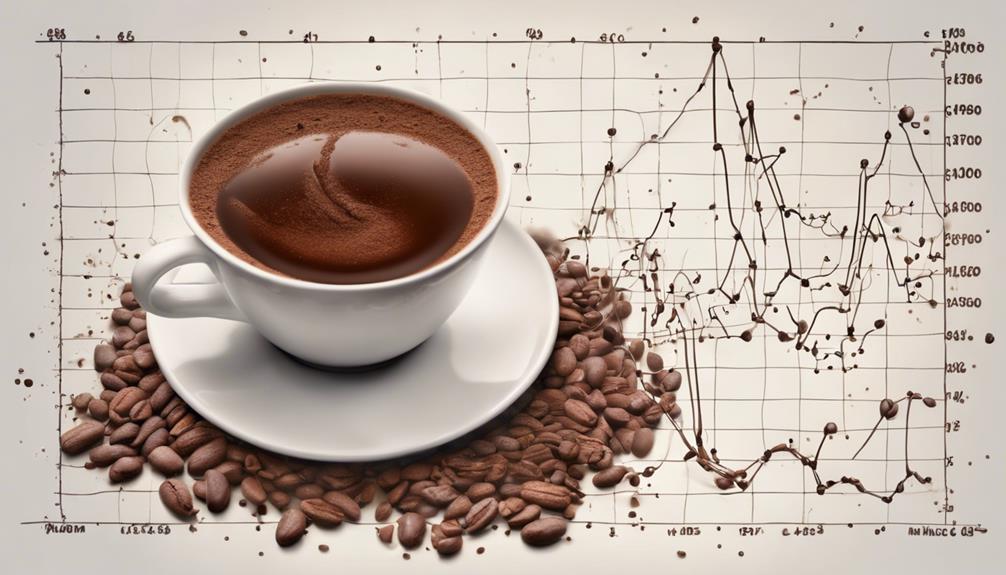
When evaluating the caffeine levels in cocoa, it’s important to recognize that dark chocolate contains around 43 mg of caffeine per 100 grams due to its high cocoa solid content. Dark chocolate has a higher caffeine content compared to milk or white chocolate. This means that consuming dark chocolate in moderation can assist in managing your caffeine intake. On the other hand, milk chocolate has around 20 mg of caffeine per 100 grams while white chocolate is caffeine-free. Cocoa powder, commonly used in baking and beverages, contains a substantial 230 mg of caffeine per 100 grams. Being aware of these distinctions in chocolates can help you make informed decisions about your caffeine consumption.
Key Takeaways
- Caffeine content in cocoa varies based on cocoa solid concentrations.
- Unsweetened cocoa powder can contain around 230 mg of caffeine per 100 grams.
- Roasting cocoa solids influences the final caffeine content in cocoa products.
- Dark chocolate, with high cocoa solid content, has more caffeine than milk chocolate.
- Moderate consumption of cocoa products helps manage caffeine intake.
Caffeine Content in Dark Chocolate
Dark chocolate boasts a caffeine content of approximately 43 mg per 100 grams, mainly deriving from its higher cocoa solid composition. When we indulge in this decadent treat, we aren't only savoring its rich cocoa flavor but also a subtle caffeine kick. Compared to milk or white chocolate, dark chocolate contains a higher amount of caffeine.
Please bear in mind that moderate consumption of dark chocolate can assist individuals in managing their caffeine intake effectively. The caffeine levels in dark chocolate are about one-fourth of what you'd find in a standard cup of coffee. So, if you're looking for a milder caffeine boost, a piece of dark chocolate might just do the trick without the jitters that sometimes accompany a strong cup of coffee.
Enjoy your dark chocolate in moderation, savoring both its taste and the gentle pick-me-up it provides.
Caffeine Levels in Milk Chocolate

Milk chocolate, known for its creamy texture and sweet flavor, contains a modest caffeine content of approximately 5.6 mg per ounce, as indicated by USDA data. Unlike dark chocolate, milk chocolate has a lighter color due to lower cocoa content, resulting in reduced caffeine levels.
The delightful creamy taste in milk chocolate comes from a harmonious blend of cocoa and milk powder. While dark chocolate boasts higher caffeine content, milk chocolate remains a popular choice for those seeking a sweet treat with minimal caffeine intake.
Caffeine Presence in White Chocolate
With its unique composition excluding cocoa solids, white chocolate stands out as a caffeine-free alternative to its darker counterparts. White chocolate is crafted from a blend of cocoa butter, milk powder, sugar, and vanilla, making it a delectable treat without the stimulating effects of caffeine. For individuals sensitive to caffeine, white chocolate offers a creamy texture and indulgent flavor without the worry of unwanted side effects. This makes it a popular choice for desserts among those looking to steer clear of caffeine in their sweet treats.
Compared to dark chocolate, which contains cocoa solids and hence caffeine, white chocolate provides a caffeine-free option for those seeking a more mellow indulgence. So, if you're in the mood for a luscious and smooth chocolate experience without the buzz of caffeine, white chocolate is the perfect choice for your next dessert delight.
Impact of Cocoa Solids on Caffeine

In determining the caffeine levels in cocoa products, the percentage of cocoa solids plays a significant role. Here are some key points about the impact of cocoa solids on caffeine content:
- Caffeine Derivation: The caffeine content in cocoa primarily comes from cocoa solids, making it an important factor in determining the overall caffeine levels in cocoa-based products.
- Dark Chocolate: Dark chocolate, known for its higher cocoa solid content, tends to contain more caffeine compared to milk or white chocolate varieties due to this higher concentration.
- Unsweetened Cocoa Powder: A 100g serving of unsweetened cocoa powder can contain around 230mg of caffeine, reflecting the impact of the high cocoa solid content in this form.
- Health Benefits: The roasting process of cocoa solids not only affects the flavor profile but also influences the caffeine content, contributing to the potential health benefits associated with consuming cocoa products like hot cocoa.
Comparing Caffeine in Different Chocolates
Comparing the caffeine content in different chocolates reveals varying levels based on their cocoa solid concentrations. Dark chocolate contains about 43 mg of caffeine per 100 grams, making it a stronger caffeinated option compared to milk chocolate, which only has around 20 mg per 100 grams.
Surprisingly, white chocolate, derived from cocoa butter, doesn't contain any caffeine at all. For those seeking a more potent caffeine kick, cocoa powder is the way to go, boasting a high concentration of 230 mg per 100 grams.
The amount of caffeine in chocolate products is closely linked to the cocoa solid content, with dark chocolate containing the highest levels. So, the next time you're craving a chocolate treat but also need a little energy boost, opt for dark chocolate to get the most caffeine per bite.
Frequently Asked Questions
Is There More Caffeine in Cocoa Than Coffee?
There's more caffeine in cocoa than in coffee. Cocoa powder packs 230 mg per 100 grams, surpassing most coffee varieties. Dark chocolate has even more caffeine due to higher cocoa content. It's a rich, unique energy source.
Is There a Lot of Caffeine in Hot Cocoa?
There isn't a lot of caffeine in hot cocoa. It depends on the brand and recipe. Starbucks hot chocolate has around 25 mg per serving, while basic mixes have about 5 mg. The amount of cocoa powder used influences the caffeine content.
Is There Caffeine in Hershey's Cocoa?
Absolutely, Hershey's Cocoa does contain caffeine, but it's not overwhelming. It adds a delightful hint of energy in each spoonful. Perfect for baking or a cozy cup of hot chocolate. Just the right amount!
Is Cocoa a Stimulant Like Caffeine?
Cocoa stimulates like caffeine due to its theobromine content. Decaf versions offer a solution for caffeine-sensitive folks. Options include regular cocoa with caffeine, Dutch-processed cocoa with less, and decaf cocoa with reduced caffeine while keeping healthful compounds.
What are the potential health effects of consuming high levels of caffeine in cocoa?
Unveiling cocoa caffeine levels can lead to potential health effects of excessive consumption. High levels of caffeine in cocoa may contribute to insomnia, nervousness, and fast heartbeat. It can also cause gastrointestinal discomfort and exacerbate anxiety disorders. Moderation in consuming caffeinated cocoa products is recommended for overall health.
Conclusion
To sum up, the caffeine content in cocoa varies depending on the type of chocolate. Dark chocolate typically has the highest caffeine levels, followed by milk chocolate and white chocolate. The amount of cocoa solids in the chocolate also affects the caffeine content.
Remember, just like different chocolates have different levels of caffeine, we all have unique strengths and abilities. Embrace your individuality and always aim for balance in everything you do.
Rachael, the Editor in Chief of RachaelsRawFood.com, is an inspiring and passionate individual who has dedicated her life to promoting the benefits of a raw food lifestyle. Known for her vibrant and energetic personality, Rachael has built a strong online presence that has transformed her personal journey into a thriving community of raw food enthusiasts.
Raw Food Ingredients
5 Key Differences: Caffeine Content in Cocoa Vs Coffee
Open the door to understanding the contrasting caffeine levels in cocoa and coffee, revealing surprising insights that will reshape your beverage choices.
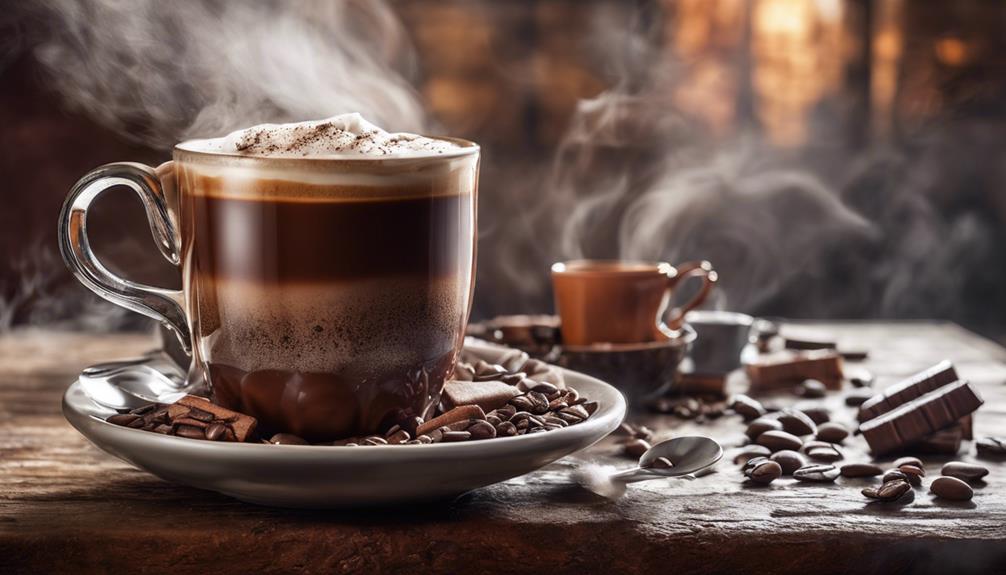
When comparing the caffeine levels in cocoa and coffee, it is important to understand that cocoa generally has lower caffeine content than coffee. Dark chocolate contains approximately 12 milligrams of caffeine per ounce, while hot cocoa typically ranges from 5 to 10 milligrams per ounce. In contrast, brewed coffee can have significantly higher levels, varying from 95 to 165 milligrams per 8-ounce cup.
Cocoa is considered a milder option for individuals aiming to limit their caffeine intake, with theobromine providing a gradual energy increase. Meanwhile, coffee's caffeine content offers immediate alertness, and understanding these distinctions can help you select based on your preferred effects.
Key Takeaways
- Cocoa contains lower caffeine levels but compensates with theobromine for a gradual energy increase.
- Coffee has higher caffeine content, offering an immediate alertness boost and potentially higher metabolic rate.
- Theobromine in cocoa promotes relaxation, while caffeine in coffee provides intense alertness and mood fluctuations.
- Hot chocolate is a good option for reducing caffeine intake while still benefiting from theobromine effects.
- Understanding caffeine variances helps make informed choices for desired energy levels and mood effects.
Caffeine Levels in Cocoa Vs Coffee
When comparing caffeine levels in cocoa versus coffee, it's evident that cocoa generally contains lower amounts per serving. Dark chocolate, made from cacao beans, contains around 12 milligrams of caffeine per ounce, while a 1-ounce serving of hot cocoa mix typically has 5-10 milligrams. Even a 16-ounce serving of Starbucks hot chocolate only contains about 25 milligrams of caffeine.
On the other hand, coffee, when brewed, can range from 95 to 165 milligrams of caffeine per 8-ounce cup, depending on the type and brewing method. This significant difference in caffeine content between cocoa and coffee makes cocoa a milder option for those looking to limit their caffeine intake.
Impact on Alertness and Energy

Typically, the immediate alertness and energy boost from caffeine in coffee can last for hours. This surge in alertness is due to caffeine's stimulating effect on the central nervous system. On the other hand, cocoa contains theobromine, which provides a more gradual increase in energy levels. Unlike caffeine, theobromine doesn't cause sudden spikes and crashes, offering a smoother energy curve.
Coffee's caffeine content can temporarily boost the metabolic rate, potentially supporting weight management efforts. This increased metabolic rate can aid in burning calories and may contribute to weight loss when combined with a balanced diet and regular exercise. Additionally, theobromine in cocoa contributes to the thermogenic effect, leading to mild calorie burning in the body.
Both caffeine and theobromine can influence mood. Caffeine tends to provide a more intense and quick-acting mood elevation, while theobromine promotes feelings of relaxation and contentment. Understanding the differences in alertness, energy, metabolic effects, and mood enhancements between cocoa and coffee can help individuals make informed choices based on their preferences and wellness goals.
Metabolic Variances and Effects
Regarding metabolic variances and effects, the varying caffeine levels between cocoa and coffee play a significant role. When comparing the metabolic impact of caffeine in cocoa and coffee, it is crucial to note that cocoa contains lower levels of caffeine but compensates with theobromine, which aids in the thermogenic effect, promoting calorie burning and metabolic activity. On the other hand, coffee, especially brewed varieties, contains higher levels of caffeine, potentially providing a temporary boost to the metabolic rate, which could assist in weight management. While caffeine in coffee offers a quick energy surge, theobromine in cocoa leads to a more gradual rise in energy levels, avoiding sudden spikes and crashes. To summarize the metabolic differences, I've created a table below:
| Aspect | Cocoa | Coffee |
|---|---|---|
| Caffeine Content | Lower levels | Higher levels |
| Additional Component | Theobromine | Caffeine |
| Metabolic Impact | Thermogenic effect | Temporary metabolic rate boost |
| Energy Levels | Gradual rise | Quick surge |
| Weight Management | Aids in calorie burning | Potential assistance |
Mood Enhancement Disparities

In comparing the mood enhancement effects of theobromine in cocoa and caffeine in coffee, notable disparities emerge in their impact on mental well-being.
The theobromine found in cocoa promotes relaxation and contentment, offering a gradual rise in energy levels that leads to a gentle and long-lasting mood enhancement experience.
On the other hand, caffeine delivers an intense and fast-acting boost in alertness, providing immediate energy levels that can lead to abrupt spikes and crashes.
While both theobromine and caffeine uplift mood, theobromine's effects are characterized by a steady and gradual increase in energy levels, creating a sense of calm and contentment.
In contrast, caffeine's impact is more intense and temporary, resulting in rapid alertness but also the potential for fluctuations in mood. Understanding these differences can help individuals choose between cocoa and coffee based on their desired mood enhancement effects.
Health Implications and Considerations
Health implications and considerations surrounding caffeine consumption warrant close attention due to its potential impact on various aspects of well-being. When comparing a cup of coffee to hot chocolate, it's vital to note the amount of caffeine present.
While coffee contains much caffeine, hot chocolate has less caffeine but isn't entirely devoid of it. The main active ingredients in hot chocolate are theobromine and caffeine, where theobromine is a relative of caffeine and also has stimulant effects, although milder. If you're looking to reduce your caffeine intake, opting for hot chocolate over a cup of coffee can be a good choice.
Being mindful of the caffeine content in chocolate products is important, especially if you're sensitive to caffeine or belong to vulnerable populations like children or pregnant women. Understanding the caffeine levels in different beverages allows you to make informed decisions about your consumption for better overall health.
Frequently Asked Questions
Is There Caffeine in Coffee Vs Cacao Powder?
Yes, there is caffeine in coffee, with around 140 milligrams in a 12-ounce cup. On the other hand, cacao powder contains only about 12 milligrams per tablespoon, making it a great caffeine-free alternative for those seeking a milder boost.
What Is the Difference Between Cocoa and Coffee?
When comparing cocoa and coffee, cocoa offers a rich, chocolatey flavor and is packed with antioxidants and minerals. Coffee, on the other hand, provides a robust, bitter taste and a jolt of caffeine for that morning pick-me-up.
Why Is Cocoa Better Than Coffee?
I believe cocoa is superior to coffee because it offers a gentler energy boost, promotes relaxation and contentment, and provides sustained vitality without sudden crashes. Plus, dark chocolate's theobromine supports cellular health and tastes delicious.
How Much Caffeine Is in Cocoa Powder Vs Decaf Coffee?
In cocoa powder vs decaf coffee, cocoa has 12-26mg of caffeine per tbsp, while decaf coffee holds 2-5mg per 8-ounce cup. The choice hinges on desired caffeine levels and flavor. I prefer cocoa's lower caffeine content.
How does the caffeine content in hot chocolate compare to coffee?
Hot chocolate caffeine content is significantly lower than that of coffee. While an 8-ounce cup of hot chocolate contains about 5-10 milligrams of caffeine, the same size of coffee can have anywhere from 95-200 milligrams. It’s a notable difference for those looking to limit their caffeine intake.
Conclusion
To sum up, while cocoa and coffee both contain caffeine, the levels vary significantly. Cocoa generally has lower caffeine content compared to coffee, impacting alertness, energy levels, and mood enhancement differently.
It's crucial to keep these differences in mind when choosing between the two beverages for your daily consumption. Remember, moderation is key to maintaining a healthy balance in your caffeine intake.
So, whether you prefer a cup of cocoa or a mug of coffee, enjoy it in moderation for the best benefits!
Rachael, the Editor in Chief of RachaelsRawFood.com, is an inspiring and passionate individual who has dedicated her life to promoting the benefits of a raw food lifestyle. Known for her vibrant and energetic personality, Rachael has built a strong online presence that has transformed her personal journey into a thriving community of raw food enthusiasts.
Raw Food Ingredients
A Guide to Becoming a Good King
Kingship demands wisdom, fairness, integrity, courage, and humility – essential traits for a successful reign and prosperous kingdom." Keep reading to uncover the secrets of becoming a good king.

In order to be a good king, one must embody wisdom, fairness, integrity, courage, and humility to lead the kingdom with honor. Wisdom is essential for making important decisions, fairness ensures just treatment for all, integrity builds trust and respect, courage is crucial for facing challenges, and humility reminds us of our humanity. Historical kings such as Solomon, Arthur, David, Charlemagne, and Ramses II serve as role models for these leadership traits.
As a king, embracing challenges, understanding the world, seeking personal growth, and learning from the past are essential responsibilities. Developing leadership skills, making wise decisions, and prioritizing the well-being of the people are key to effective kingship. Every step on the path to becoming a good king is critical for a successful reign and prosperous kingdom.
Key Takeaways
- Embrace wisdom for informed decisions.
- Practice fairness for just treatment.
- Uphold integrity to earn trust.
- Show courage in facing challenges.
- Maintain humility for empathy and respect.
Qualities of a Good King
Being a good king requires embodying qualities such as wisdom, fairness, integrity, courage, humility, and compassion in decision-making and leadership. Power comes with responsibility, and as a king, it's essential to wield this power wisely. Wisdom is vital in making sound judgments that benefit the kingdom as a whole. Fairness guarantees that all subjects are treated justly and equitably, fostering a harmonious society. Integrity is the foundation of trust and respect, key elements in effective leadership.
Courage is necessary to face challenges and make difficult decisions, even when met with opposition. Humility reminds a king of his humanity and the importance of humility in interactions with all subjects. Compassion demonstrates a king's care and empathy towards his people, fostering a sense of unity and loyalty. Effective communication is crucial for conveying decisions, listening to concerns, and inspiring confidence in leadership.
Historical Kings as Role Models

King Solomon, renowned for his wisdom and leadership, stands as an exemplar among historical kings who serve as role models for future leaders. Looking at figures like King Arthur, known for his justice and valor in medieval legends, and King David, celebrated for his faith and courage in battle, we find lessons that transcend time. Charlemagne's legacy of military conquests and cultural revival, alongside Ramses II's grand building projects and military campaigns, offer diverse insights into effective kingship. Below is a table summarizing key attributes of these historical kings:
| King | Attributes |
|---|---|
| King Solomon | Wisdom, leadership |
| King Arthur | Justice, valor |
| King David | Faith, courage |
| Charlemagne | Military prowess, culture revival |
| Ramses II | Building projects, military campaigns |
Studying these historical figures can provide valuable lessons on the multifaceted qualities that make a great ruler.
Responsibilities of Kingship
Embracing challenges and living authentically are central to fulfilling the responsibilities inherent in kingship. As men aspiring to be good kings, it's essential for us to understand that the world requires leaders who are kind, humble, and committed to personal growth.
The journey to becoming a good king involves more than just wielding power and responsibility—it entails sacrificing comfort for growth and transformation. Seeking the ancient path of masculinity, as exemplified by figures like Morgan, teaches us the importance of humility, vulnerability, and character development.
In fulfilling the responsibilities of kingship, we're entrusted with power not for our own gain, but for the betterment of the world around us. Just as seeds need Good Soil to flourish, we must nurture our own growth to lead effectively.
Leadership Skills for Kings

Developing essential leadership skills is crucial for aspiring kings seeking to fulfill their responsibilities with humility, vulnerability, and a focus on character development. As you study the world around us, the power and responsibility of what kingship entails become clearer. Here are some key points to think about on your path to becoming a king:
- Embrace challenges and live authentically.
- Seek ancient paths of masculinity for guidance.
- Reflect on your identity, purpose, and ability to be entrusted with power for good.
- Sacrifice comfort for growth, transformation, and participation in universal creativity.
The journey of becoming a king isn't just about gaining authority but about understanding the remarkable fellowship of like-hearted individuals who share similar goals. Engage in group discussion questions, consider between-session personal study, and explore the depths of your masculine soul. This is the path to restoring what it means to be a true king.
Importance of Wise Decision-Making
Steering through the intricacies of leadership, especially in the domain of kingship, requires a sharp focus on the art of prudent decision-making. Wise decision-making is like the compass guiding the ship of leadership towards success.
Good kings understand that their choices impact not just themselves but also the lives of those they rule over. They prioritize the well-being of their people over personal gains, embodying the essence of true leadership.
Seeking counsel from trusted advisors and reflecting on core values are essential practices in the domain of wise decision-making. By embracing humility and self-awareness, kings can navigate the complex web of choices with clarity and integrity.
Just like a six-session video Bible study can guide individuals in restoring the heart, wise decision-making is essential for becoming the kind of leaders our world needs. Let's start on this journey of radical reconstruction, where every decision is a step towards being counted among the good kings of history.
Frequently Asked Questions
What Is the Becoming a King Guide?
The Becoming a King guide is a transformative resource created by Morgan Snyder to help men grow into responsible kings. It offers practical tools and profound insights to aid personal development and transformation.
What Are the Qualities of a Good King?
Being a good king means embodying humility, wisdom, and integrity. Prioritizing the well-being of my people, making decisions for the greater good, and showing courage, justice, and compassion in all actions. Seeking counsel and valuing diverse perspectives is essential.
What Makes a True King?
Beneath the crown lies a heart that beats with humility and a spirit that soars with honor. True kings are forged in the fires of challenge, embracing authenticity and growth to inspire others.
What Makes a Real King?
Being a true king means embodying humility, courage, and empathy. It's about serving others and leading with integrity. I endeavor to cultivate these qualities daily, embracing challenges and seeking growth in all aspects of my life.
How Can Sacred Cacao be Incorporated Into Kingship Rituals?
In kingship rituals, the sacred cacao ritual holds great significance. The ceremonial drinking of cacao symbolizes the divine connection between the ruler and the spiritual realm. It is believed to impart wisdom and strength, making it a crucial element in the coronation and leadership rites of many cultures.
Conclusion
To sum up, becoming a good king requires a combination of qualities, skills, and responsibilities. Remember, 'With great power comes great responsibility.'
By studying historical kings as role models, practicing leadership skills, and making wise decisions, one can aspire to be a just and effective ruler.
It's a challenging path, but with dedication and perseverance, anyone can endeavor to be a worthy leader for their kingdom.
Rachael, the Editor in Chief of RachaelsRawFood.com, is an inspiring and passionate individual who has dedicated her life to promoting the benefits of a raw food lifestyle. Known for her vibrant and energetic personality, Rachael has built a strong online presence that has transformed her personal journey into a thriving community of raw food enthusiasts.
-

 Raw Food Ingredients2 months ago
Raw Food Ingredients2 months agoHow To Make Hot Chocolate With Raw Cacao Powder
-

 Raw Food Ingredients2 months ago
Raw Food Ingredients2 months agoHow To Make Chocolate From Raw Cacao
-
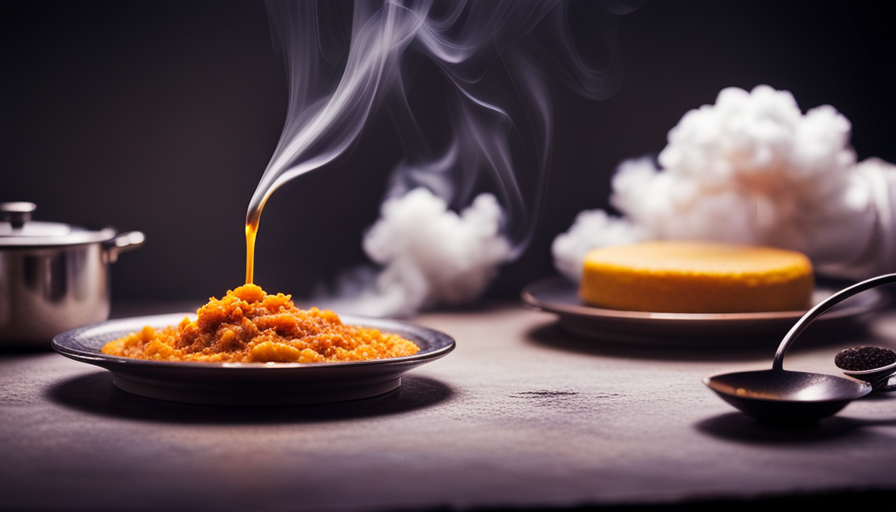
 What is Raw Food?2 weeks ago
What is Raw Food?2 weeks agoHow To Remove Raw Mustard Oil Smell From Cooked Food
-

 Raw Food Ingredients4 weeks ago
Raw Food Ingredients4 weeks agoRaw Cacao Powder How Much For 8 Oz Hot Chocolate Recipe
-
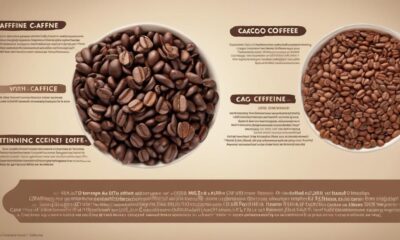
 Raw Food Ingredients4 weeks ago
Raw Food Ingredients4 weeks agoThe Truth Behind the Cacao Caffeine Myth
-

 Raw Food Ingredients2 months ago
Raw Food Ingredients2 months agoWhen Fasting Can I Drink Coffee With Raw Cacao Powder
-
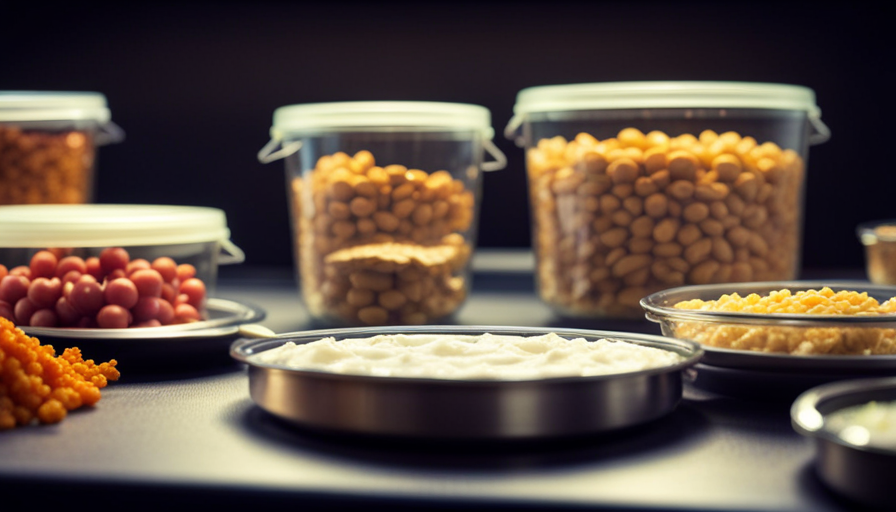
 What is Raw Food?2 weeks ago
What is Raw Food?2 weeks agoHow To Store Raw And Cooked Food Separately
-
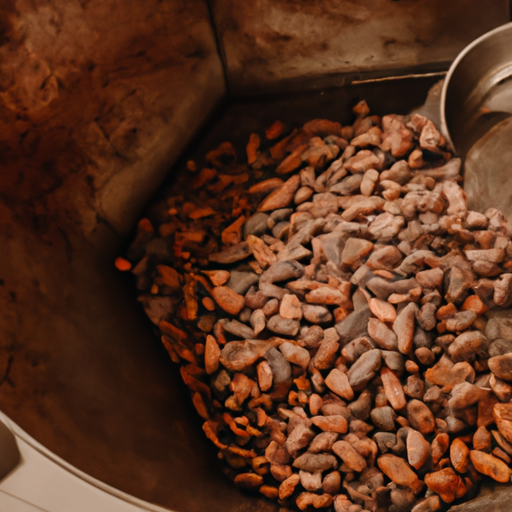
 Raw Food Ingredients2 months ago
Raw Food Ingredients2 months agoHow To Use Raw Cacao Beans







